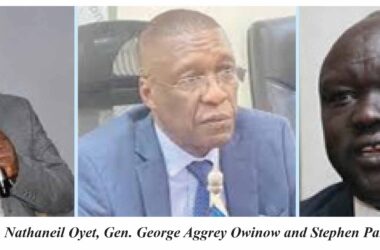By Bida Elly David
Members of Parliament on Wednesday increased the civil servants and organized forces salaries budget to SSP 669 billion.
The salary allocation has been increased by SSP 224 billion from the initial proposed SSP 445 billion.
This adjustment came in the report of the parliamentary specialized committee for Finance and Economic Planning on the national budget presented at the second reading stage.
The 2023–24 national fiscal budget was passed to the third reading with amendments.
The President had already directed the salaries of the civil servants to be increased by 400 Percent.
The chairperson of the specialized finance committee, Hon. Changkouth Bichiock said after scrutiny, the 400 percent increment was not enough.
He said the committee resolved to deduct certain percentages from other public institutions’ budget allocations to top up the remuneration for civil servants and organized forces salaries.
“The priority of this year’s FY2023/2024 budget is the increase in salaries and wages of our civil servants, army, and other organized forces. The 400% increment provided in the budget by the executive is not sufficient,” Mr. Changkouth noted.
The finance committee, however, did not present a breakdown of how much a civil servant or foot soldier will receive per grade or rank.
The Committee of Finance recommended cutting off allocations from other institutions to cover up the additional budget for salaries.
“For the government to get funding for these, the committee recommends working within the ceiling by making cuts from Chapter 2, which is the cost of goods and services, and other relevant chapters.” Changkouth said.
“The committee recommends the following cuts: ministry of Roads and Bridges, SSP 200,000 billion; Ministry of peace budget, SSP 6 billion; Ministry of presidential affairs, SSP 5 billion; and ministry of Finance and Planning, SSP 7 billion,” the committee’s report stated.
Hon. Changkouth added that the deducted budget was not meant to only cover remuneration for civil servants and soldiers but also other key institutions with low levels of allocation.
However, the recommendation of the institutional deduction planted divided thoughts among parliamentarians, as others argued that the roads and peace ministries budgets should not be tempered.
First deputy speaker of the R-TNLA, Nathaniel Oyet concurred with the salary increment for public employees and the army but protested the deduction from the peace ministry’s budget.
“We must cut and cut the budget for our civil servants and the soldiers to have their salaries increased,” he said. “We cannot leave them to suffer with the current inflation.”
“We also need to know that the peace budget is too small to implement the agreement; there is no need to cut it,” Oyet maintained.
He said that SSP 50 billion to accomplish all the tasks within the agreement is a little money that instead needs additional cash.
Meanwhile, Jemma Nunu Kumba, the speaker of the assembly, paused the discussion and said the debate on the cuts per institution would be deliberated during the third reading of the budget.
In June, the National Minister of Finance and Planning tabled a whopping SSP 2 trillion budget for the fiscal year 2023–2024.
The proposed expenditures have been allocated over SSP 455 billion for salaries and wages, over SSP 50 billion for the implementation of the peace agreement, and over SSP 47 billion for the constituency development fund (CDF).




